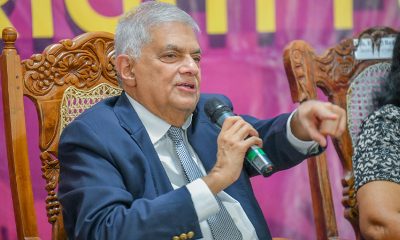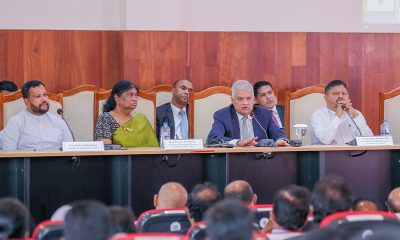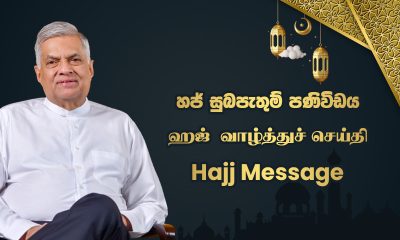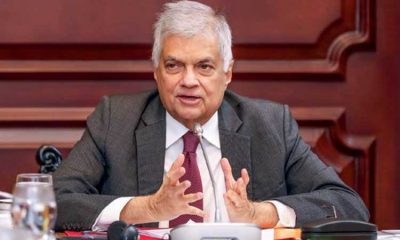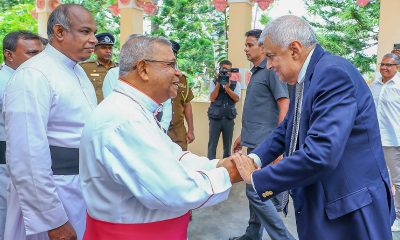Editorial
Bragging, begging and booing

Friday 5th January, 2024
The UNP is in overdrive to shore up what remains of its image with an eye to the next election. It is bragging that the country has posted a primary surplus after a lapse of more than two decades. It insists that credit for this be given to President Ranil Wickremesinghe, who is also the Minister of Finance.
A positive primary balance is no mean achievement for an insolvent nation. As for the countries troubled by staggering outstanding public debt, achieving a primary surplus could be considered very important, but the fact remains that necessary as it may be, it is not sufficient for achieving debt reduction, which requires a multi-pronged strategy and the proper implementation thereof.
The government has a long way to go before it can put the economy on an even keel. It is hoped that the UNP supporters who lit firecrackers at Sirikotha and made a spectacle of themselves when the IMF announced the release of the first tranche of its loan, in March 2023, will not do likewise to celebrate the marginal primary surplus.
In increasing state revenue, the SLPP-UNP administration seems to think that the end justifies the means. Blind to the social costs of its extreme actions, it has resorted to jacking up taxes and tariffs exponentially without exploring alternative means of boosting state revenue. Ironically, TIN (Tax Identification Number) has been made mandatory for even young citizens aged 18, whose parents have been reduced to penury and left with no alternative but to beg for alms, with empty ‘tins’ in hand. Sri Lanka must be the only country where a bunch of failed, corrupt rulers who deserve to be thrown behind bars for bankrupting the economy are allowed to stay in power, live the high life at the expense of the public and, worse, punish the victims of their economic crimes by increasing taxes and tariffs in the name of economic recovery.
If the Rajapaksa-Wickremesinghe government streamlines revenue collection and expands the personal tax base, it will be able to lessen its dependence on indirect taxes, which affect the entire population. Tax increases alone will not help the government achieve its revenue targets. For instance, the enhanced VAT regime has sent liquor prices up, but there is no guarantee that the government will be able to rake in the projected revenue from the tax increase, for it has failed to eliminate the revenue sticker racket; liquor manufacturers can continue to release part of their output into the market surreptitiously and avoid taxes thereon. Successive governments have not taken action to rid the revenue generating state agencies, such as the Customs and the Department of Motor Traffic, of corruption, which is believed to cost the state coffers billions of rupees a year.
The government has also not cared to curtail its expenditure while asking the public to tighten their belts. This is an election year, and the ruling party politicians have embarked on an election campaign in all but name by spending public funds. They are stumping the country on the pretext of attending official events. It is time laws were brought in to prevent politicians from spending taxpayers’ money on election campaigns.
Chief Government Whip and Minister Prasanna Ranatunga has unwittingly disclosed, in a bid to turn public opinion against the Opposition for disrupting last month’s VAT debate in Parliament, that a single parliamentary sitting costs the public as much as Rs. 10 million. More often than not, parliamentary sessions are inquorate, and debates serve little purpose. Serious thought should therefore be given to downsizing Parliament and curtailing the cost of maintaining it.
Let the government be urged to be mindful of the social, political and economic consequences of overtaxation. Extremely high taxes hamper economic growth in the long run. It greatly reduces the people’s spending power and thereby limits consumer activity, and investment. It also discourages entrepreneurship and innovation and reduces job creation and competitiveness. Overall, it adversely impacts quality of life, as evident from the increasing number of public protests against overtaxation, which leads to tax evasion or avoidance, taking its toll on state revenue.
The government had better stop bleeding the public dry at least for its own sake. People’s anger has reached a tipping point. A cantankerous ruling party politician who attended a meeting in Anuradhapura the other day had to head for the hills to the accompaniment of a cacophony of boos from the people present there. This could be considered the portent of the onset of another tsunami of public consternation.
Editorial
Specious arguments

Tuesday 29th April, 2025
The government and the Opposition are engaged in a no-holds-barred battle to win the upcoming local government (LG) elections. Their election campaigns have turned down and dirty, and the polity is red in tooth and claw, with vilification campaigns being carried out against not only politicians but also their kith and kin.
If the ruling NPP fails to retain its votes at the current level next month, the Opposition will claim to have made a breakthrough in its battle against the government. This is something the NPP needs like a hole in the head. If the Opposition parties, especially the SJB, the SLPP and the UNP-led NDF, fail to recover lost ground and improve their electoral performance significantly, they will have to face a long haul in the political wilderness. So, it is only natural that both the NPP and the Opposition are doing everything in their power to shape and sway public opinion in their favour.
Some NPP MPs have put forth an absurd argument; they say that since their party has won both presidential and parliamentary elections, the local councils, too, should be placed under its control if the people are to benefit. If the public is convinced that the NPP is better than its predecessors and can be trusted with the administration of the local councils as well, they may vote for the NPP, but they must not do so simply because the NPP has won the executive presidency and is controlling Parliament.
A democracy worthy of the name should be able to function properly in situations where the three tiers of government are controlled by different political parties. The Colombo Municipal Council remained under UNP control for decades during SLFP/SLPP governments. The JVP bagged the Tissamaharama Pradeshiya Sabha in 2002 while Chandrika Bandaranaike Kumaratunga, who led the People’s Alliance (PA), was the President, and the UNP led by Prime Minister Ranil Wickremesinghe was controlling Parliament. It won six seats as opposed to the PA’s two and the UNP’s four. The JVP, which leads the NPP, is now using the exact opposite of the argument it touted in 2002 to persuade the people of Tissamaharama to vote for it!
There is an incomprehensible practice of handing over the reins of Parliament to the party that wins a presidential election, and this makes one wonder whether there is any point in holding separate parliamentary elections. A popular mandate given to the Executive President does not cancel that of the party controlling Parliament.
The SLPP, the SLFP and the UNP have set a very bad precedent. Last year, the SLPP government stepped down, allowing the NPP to secure control of Parliament after Anura Kumara Dissanayake’s victory in the presidential race. In 2015, the SLFP-led UPFA gave up control of Parliament, upon the election of Maithripala Sirisena as President, enabling the UNP-led UNF to form a government. The UNF government did likewise in 2019, when Gotabaya Rajapaksa was elected President. The SLPP controlled Parliament, without a mandate, from Nov. 2019 to August 2020. In 2015, within a few weeks of forming a government without a popular mandate, the UNF facilitated the first Treasury bond scam.
The Executive Presidents do not resign when their parties lose general elections. Haven’t those who vehemently oppose the Executive’s interference in the legislature themselves subjugated the ‘independence of Parliament’ to the will of the President?
There is also another flawed argument that the people should strengthen the hands of President Dissanayake to govern the country better by bringing the LG authorities under NPP control and thereby enabling him to have his policies and programmes implemented effectively at the grassroots level. President Dissanayake has been controlling not only the LG bodies but also the Provincial Councils through the Governors appointed by him, the way Presidents Gotabaya Rajapaksa and Ranil Wickremesinghe did. The Special Commissioners who are currently in charge of the local councils report to the Governors and therefore they are at the beck and call of the President.
It is hoped that the public will not be swayed by preposterously specious arguments that are being touted by the government and the Opposition.
Editorial
Of that colourless evil

Monday 28th April, 2025
The truth becomes the first casualty of any propaganda campaign, especially in Sri Lankan politics, which exemplifies the Macbethian paradox—fair is foul, and foul is fair; politicians of all hues have mastered the art of stretching the truth to the breaking point ahead of elections and duping the public.
The truth is distorted or exaggerated in such a way during election campaigns that it becomes hardly distinguishable from an outright lie in most cases, as evident from claims and counterclaims at the ongoing propaganda rallies, where mistruths, half-truths, lies and about-turns have become the order of the day. Interestingly, some self-righteous candidates and their leaders are accusing their political rivals of uttering lies, while they themselves are lying their way through, so much so that one is justified in saying, “Lies, damned lies, and campaign rhetoric.”
There has been a real hullabaloo over a statement made by President Anura Kumara Dissanayake at an NPP election rally recently. He said something in Sinhala to the effect that the government would readily allocate state funds to the local councils to be won by the NPP, as he could vouch for the integrity of only the candidates of his own party, and where other councils were concerned, the government would have to exercise stringent oversight in reviewing requests for funds to guard against malpractices in a manner that might lead to delays.
The Opposition has amplified the subliminal message in the President’s statement, making a hue and cry over it. Its speakers thunder from political platforms, claiming that the President has threatened to stop state funds to the councils to be won by the parties other than the NPP. They have gone so far as to lodge a complaint with the Election Commission against the President and the NPP, and declared that they are capable of running local government authorities under their own steam without seeking funds from the government!
When the presidential statement at issue, which borders on a warning, is viewed under the microscope, a veiled threat becomes discernible in its subtext; however, the President and the government could have defended it effectively on the grounds of their accountability for ensuring financial probity in local councils. They should have quoted the President’s statement in question verbatim in support of their argument. But President Dissanayake has since changed his position in a bid to obfuscate the issue, claiming that he said he will not allow corrupt politicians to steal state funds and therefore local government bodies reeking of corruption will not get any tax money, which has to be frugally managed. He has, true to form, taken the moral high ground.
The Opposition has failed to point out that the government is relying on individual politicians and not systems as such to battle corruption in local councils, and the President’s statement at issue is tainted with petitio principii or circular reasoning; the President has assumed that only NPP candidates are honest and used that assumption to support his argument that the councils under their control will be free from corruption and therefore qualified to receive state funds.
There are already systems in place to tackle bribery and corruption in state institutions, and if they are used to deal with the people’s representatives and officials indulging in corruption, local councils will be free from corruption regardless of the political parties controlling them. There is a need for stronger legal and enforcement mechanisms, and it is up to the government to introduce them, as a national priority. Those who seek approval for building plans, etc., are at the mercy of local council heads and officials, who cause unnecessary delays so as to have their palms greased. The public should be able to report such instances to a higher authority and obtain relief reasonably fast.
Corruption is colourless, to begin with; it is neither green nor blue nor red nor maroon. It transcends party lines and ideological affiliations. Hence the need for Sri Lanka to battle the colourless evil by putting in place robust mechanisms and ensuring the strict enforcement of anti-corruption laws to achieve that noble end.
Editorial
The Pope who changed the Church

When conservative Pope Benedict XVI stepped down in 2013, citing frailty of body, the Catholic world braced for a like-minded successor. All eyes were on Italian Cardinal Angelo Scola, then 71, a theological twin of Benedict and the bookmakers’ favourite. But as the age-old adage in Rome goes, “He who enters the conclave as pope, exits as cardinal.”
When white smoke emerged from Sistine Chapel, the bells of St. Peter’s rang and the words “Habemus Papam” echoed across Vatican, it wasn’t Scola who emerged on the balcony, but the football loving cardinal from Argentina – Jorge Mario Bergoglio. Unknown to most beyond Buenos Aires, the man from the ends of the earth would soon become the beating heart of the Catholic Church.
From the outset, it was clear that this would be no ordinary pontificate. Instead of donning the grand papal clothes, the new Pope stepped out in a plain white cassock, as if to say, “let me walk with you, not above you.” And in a moment of breathtaking humility, before blessing the faithful, he knelt down, bowed his head and asked them to bless him. The world witnessed not a showman cloaked in ritual, but a shepherd clothed in grace.
He chose the name Francis – after the saint of Assisi, who embraced poverty and loved nature. No Pope before him had borne the name. It was not a name picked randomly, but a vow to the poor, to peace, and to simplicity. For 12 years, Francis lived what he preached, endearing himself to millions and became the most beloved pontiff overtaking John Paul II.
As head of the Jesuits in Argentina and later as Archbishop of Buenos Aires, he was known to travel by train, mingling with commuters, rubbing shoulders with the working class. Upon assuming the Chair of St. Peter, he left behind the opulence of the Apostolic Palace and took up residence in a modest guesthouse room. The bulletproof papal limousine was also replaced with an ordinary car. It was a reminder to the world and the Church, that one cannot preach the Gospel from a golden throne while the flock is lost in the wilderness.
Even in death, he remained true to form, requesting a simple funeral, free of pomp and circumstance, in stark contrast to centuries-old Vatican tradition.
Pope Francis lifted his voice for the voiceless. He was the trumpet for the immigrant, the refugee and the outcast. In meeting halls of power – from the White House to the United Nations – he urged leaders to show compassion. His message found a receptive ear in Joe Biden, the first Catholic President of the United States since John F. Kennedy. But when Donald Trump took a hard-line stance on deportations, the Pope was quick to pen a sharply worded appeal, reminding the world that every soul is sacred, every migrant a child of God.
Within the Church, Francis was a reformer unafraid to rock the boat. He opened the doors of communion to divorced Catholics, ruffling feathers among traditionalists. He declared that homosexuality is not a sin, echoing Christ’s own words, “Judge not, that you be not judged.”
He gave women greater roles within the Church’s hierarchy – appointing them to senior positions within the Vatican and amending Cannon Law to allow them to serve as lectors and distribute Holy Communion. When asked about the shift, the Pope, with his trademark wit, quipped, “They certainly manage the finances better than men.”
In his quest to decentralize power, Francis broke the mold of predictable cardinal appointments. No longer was it a given that bishops of major European dioceses would receive the red hat. Instead, he elevated humble, pastoral leaders from far-flung corners of the world – Papua New Guinea, Tonga, and Haiti – redefining what it meant to be a Prince of the Church.
He also took bold steps to clean the Vatican’s tarnished image. When Cardinal Giovanni Angelo Becciu was embroiled in a financial scandal involving a failed London real estate deal, Francis asked for his resignation. Becciu would go on to become the first cardinal ever convicted by a criminal court. It was a clear sign that accountability had found a home within the hallowed halls of the Vatican.
Francis was not just a pontiff in name. He was a shepherd after God’s own heart. Like the Good Samaritan, he tended to the broken. Like the prodigal’s father, he welcomed the lost. And like Christ Himself, he did not shy away from overturning the tables when righteousness demanded it.
As he returns to his Creator, the College of Cardinals will gather to elect a new successor. Of those 135 Cardinals, 108 were appointed by Francis himself. While papal predictions are a fool’s errand, the writing on the wall suggests that his successor will carry the torch of humility, justice, and mercy.
The curtain falls not on an era of power and pageantry, but on one of pastoral care and prophetic courage. Pope Francis may be gone, but the seeds he sowed in the vineyard of the Lord will continue to bear fruit in due season.
-

 News7 days ago
News7 days agoOrders under the provisions of the Prevention of Corruptions Act No. 9 of 2023 for concurrence of parliament
-

 Business2 days ago
Business2 days agoPick My Pet wins Best Pet Boarding and Grooming Facilitator award
-

 News6 days ago
News6 days agoProf. Rambukwella passes away
-

 News2 days ago
News2 days agoNew Lankan HC to Australia assumes duties
-

 Features2 days ago
Features2 days agoKing Donald and the executive presidency
-

 Business2 days ago
Business2 days agoACHE Honoured as best institute for American-standard education
-

 Features4 days ago
Features4 days agoThe Truth will set us free – I
-

 Features6 days ago
Features6 days agoThe sea-change after Modi’s visit



